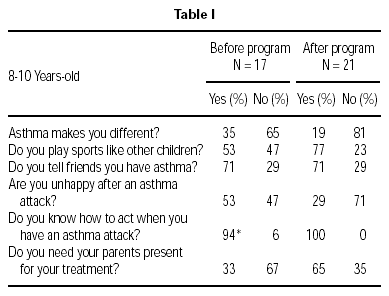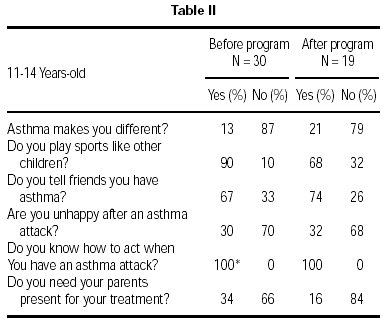INTRODUCTION
Bronchial asthma is one of the most common chronic childhood disease. Factors secondary to asthma, as missed school days, difficulties to practise sports... can increase frustrations, undermine the child's self-image and create a high level of fear and anxiety in the child and in the family.
Asthmatic childs need, not only a medical treatment, but also the control and management with symptoms and crisis, realising that the disease is not a barrier to get on with life and typical activities at their age. So, an asthma self-management educational program, helps to complete the medical treatment, and summer camps are the ideal place for it.
Madrid-Castilla La Mancha Allergy Society organizes camps for 8 to 14 years-old-asthmatic childs in order to teach them a self-management program, directed by allergists, nurses and sanitary complement, specialized in this topic.
In these camps children with the same problem live and play together and are provided of medical coverage during 24 hours by certified allergists with the co-operation of allergy fellows-in-training and nurses.
Three times a day, or more if necessary, we control the respiratory flows with peak flow meter (PFM), they learn to practise swimming as respiratory phisiotherapy and participate in a camp experience, as examples of the camp participating advantages.
The goal of this physician's total care is to build the child confidence to fully participate in all life's activities without fear, to educate children about asthma and effective health management skills, to let them be more self-sufficient and gain confidence with a more positive attitude about their disease and also to reduce the family stress and overprotectiveness and improve their independence.
The objective of this study is to evaluate the results of the asthma educational program taught in the camp, setting, through a questionnaire answered by the children during and after camp, and comparing the results.
MATERIAL AND METHODS
Population
Fifty-four children with moderate to severe asthma between the ages of 8 to 14 years old participate in the camp (twenty-one between 8 and 10 years old and thirty-three between 11 and 14).
Asthma: Seasonal in 8 patients and perennial in the other 46 patiens, 76 % of them are polisensitized to different allergens. No hospital admissions in any of the children in the last year.
Treatment: 71 % use inhaled steroids, and the rest of them are treated with oral anti-leucotriens or both of them. All of them have short life b -adrenergics just in case of emergency.
Inmunotherapy was used in only 5 of them, as most of them are polisensitized.
Thirteen children with food allergy (to egg, milk, fruits, nuts...), 15 with atopic dermatitis and 3 with drugs adverse reactions.
Camp structure
Villalba de la Sierra is a little town in Cuenca, 150 kilometers away from Madrid (Spain). The camp is located in a mountain near that town. There is a river called Jucar which crosses the camp. The experience goes on for one summer week.
There are several houses for 10 children and a doctor in each one, and another house with the dining room. Different basketball, football grounds and swimming-pool are available.
Activities
The camp includes educational, athletic, and social activities. Campers participate daily in instructive and didactic teaching sessions.
We organize nine childrens' groups, with similar age. Every nine children are supervised by a physician who accompanies them in their activities and plays; joining them for the teaching session and for the PFM registration three times a day.
The daily session takes 2 hours time after the breakfast. The aim is the self-management program that includes discussion of asthma triggers, early warning signs, medication usage and side effects, metered-dose inhaler (MDI) techniques, and personal action plans. Depending on the age of the group we use plays or even "theatre" to keep their attention and let them learn to control their disease.
Apart from the session, three times a day (before breakfast, lunch and before bed time), we control the PFM of each one, writing the value down in their notebooks to get a good view of their evolution. After that, one by one takes their medications with the right technique.
The rest of the day, campers are expected to participate in athletic activities included soccer, basketball, swimming and canoeing, helped by cheer leaders; they also learn relaxing techniques.
Questionnaire
A pre-camp questionnaire (The first day camp) is filled by every child with the following questions:
1. Do you think having asthma makes you different?
2. Do you play sports like other children?
3. Do you tell friends you have asthma?
4. Are you unhappy after an asthma attack?
5. Do you know how to act when you have an asthma attack?
6. Do you believe your parents should be responsible for your treatment?
These data are collected again by mail, two months after the camp. Results are analysed into two age groups, one between 8 and 10 years old and the other between 11 and 14.
We take into account this difference, due to asthma in adolescence is considered a special entity because of the typical characteristics of this period of life.
In the 8-10 years old group:17 answer the questionnaire during the camp, and 21 after it.
In the other group, 30 answer it in the camp and only 19 do it by mail after it (tables 1 and 2).
RESULTS
Children from 8-10 years
In the questionnaire answered in the camp, 35 % of the children feels different to be asthmatic whereas only 19 % feel like this after the camp.
In the same way, when the question is, if they do exercise as their friends, 53 % goes to 77 % after the camp. 94 %* afirm to know what to do in an asthma crisis before the camp, but when you ask them specifically only 23 % would do it right; after the camp,100 % really manage any situation, taking a good attitude, keeping calm and choosing the right drug and dose to solve the situation.
In the other way, the group that feels unhappy after a crisis, goes from 53 % to 29 % after the camp experience.
Children from 11-14 years
The answered questionnaires received after the camp was ony 19, whereas 30 answered it in the camp. 80 % of the children had previously participated in a self-management program, before the camp.
In an asthma crisis 100 %* thinks to take the right attitude, but 90 % of them would use a short action beta-agonist, and the rest of them wouldn't use the right treament, and after the camp 100 % know that the indicated drug to solve the crisis are those inhalers.
After the camp 84 % of them doesn't need their parents to do the daily treatment, whereas in the camp only 66 % were independent.
They also learn what kind of exercise they can practise to relax and breath better and keep calm, when the crisis appear.
In the other way, after the camp, there are more children that feel different as they are asthmatic (13 % to 21 %), as well as the group that feels unhappy after a crisis which presents no significant changes, (27 % to 32 %); there are also a drop after the camp, in the group that thinks to do exercise as their mates: 90 to 68 %.
DISCUSSION
Children from 8 to 10 years
Usually in this range of age they feel inferior to their mates, as they don't feel able to practise sports as the others do. This group practises more exercise after the camp, and it's likely that the reason is the improvement in their self-confidence to do it. Besides, the better knowledge of the disease after the asthma education program, allows them to get on with life, fostering their independence to participate in normal childhood activities.
In the other hand, in spite of learning to manage with symptoms and treatment, they still need and depend on their parents to use the daily drugs, maybe because of the little age.
Children from 11 to 14 years
Evaluating our results, the camp activities teach them to choose the right treatment depending on the clinical situation. They also realize they should be responsible for the comply with daily treatment, instead of depending on their parents.
Quite the contrary, in their answers after the camp, the group that feels different to the other children, inferior to practise sports and depressing after the crisis, grows, although they do all the activities with no symptoms and no crisis during the camp. Probably, it's because they face up to a cronic disease.
Adolescence is a growing period from childhhood to maturity, where the person trys to get a social interaction, self-confidence and autonomy, and this disease results in a restriction of this autonomy, since it's a cronic disease that makes them depend on their parents, treatment and periodical medical control1,2
Asthma prevalence in this age is 2,8-38 % depending of the series2.
It's essential for them to identify the symptoms as soon as they appear, recognize the severity of the disease and a early use of the right treatment, to promote prevention of attacks.
About 33 % of adolescents don't identify the first symptoms2, 52 % don't comply the treatment2, and less than one third of the asthmatic adolescents uses their inhaler correctly, with a "good" inhaler technique3. These factors make this age one of the most risky life period, when vital risk crisis increase2.
Asthma education can be didactic and practical, and camp is the best way to develop a self-management program4, but this, faces the adolescents up to a cronic disease, which needs medical follow-up and treatment, in a particular group of age that denies feeling a disease, refuses to follow a medical control and to use daily treatment1,2, feeling themselves pushed back by the society, as they need medication and sometimes feel unable to do the same activities as their mates.
This age group improves the disease self-management after the camp, at the expense of feeling asthma as a restriction of their auntonomy, cause they face up with the disease.
CONCLUSION
There are several studies evaluating the improvement in children's knowledge of asthma and its management, after a camp experience5-19.
The most evaluated parameters in most of them, are changes in pulmonary function (peak flow meter values), school absenteeism, emergency room visits, use of beta-adrenergists, number of asthma attacks5,6,8,17, before and after the camp.
We tried to examine how the better disease knowledge, results in good quality of life, fostering their independence and self-confidence, that means putting the illness into proper perspective.
For the youngest ones, this is usually the first camp experience and self-management program, so we should insisit on medical and treatment aspects, so they learn what to do and use in each situation and after the camp, they are more independent and that makes them fell better.
In the 11-14 years group, the most important items to focus on, are the self-concept and social integration.
Our results strengthen the idea of considering the asthma in adolescents as a particular entity, because of the characteristics of this age1,2,3,4. After a week in the camp, they realize asthma is a cronic disease that needs medical care and treatment. Adolescence is a risky period with a high asthma mortality rate, so it's important for this children get the right disease management, but quite the contrary they are more conscious of the disease which makes them feel worse after the experience.
Both age group get a positive result from the experience.
There are now over 80 summer camps in operation4.
We should go on with this effort, to get that asthmatic children feel themselves with no barrier to get on with life, similar to their friends.
The camp is also a wonderful experience for sanitary: fellows-in-training, doctors and nurses, as we can see aspects of asthma, imposible to get in the clinical practice in hospital.








